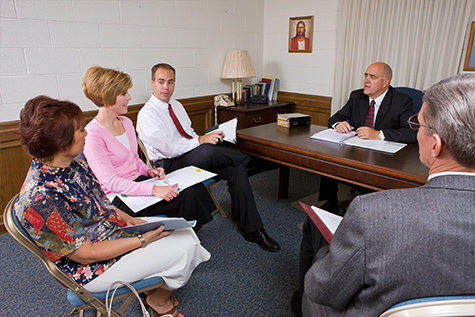Serving on the Agent Stake Operating Committee
7.1 Introduction
Because Employment Resource Services assists priesthood leaders with their members’ employment and career development needs, ERCs are assigned to an agent stake. The ERC operates under the direction of the agent stake president.
The agent stake president is the chairman of the ASOC that oversees ERC operations. The agent stake president also represents the ERC in a coordinating council, and he seeks counsel and support from his fellow leaders in the coordinating council.
The manager of the ERC serves on the agent stake operating committee. The information in this section will help you understand the role of the agent stake operating committee.
For more information on the role of the agent stake and other leaders who provide direction to the ERC, refer to Orientation Lesson 4, “Center Leadership and Performance.”
7.2 Agent Stake Operating Committee (ASOC)
The Area Presidency or a member of the Presidency of the Seventy assigns an agent stake to provide priesthood direction to each ERC. The Area Presidency and the president of the agent stake define the center’s priorities and goals. When an agent stake is assigned to an ERC, the stake president organizes an ASOC.
The committee is composed of:
- The agent stake president
- The stake bishops’ welfare council chairman
- The stake Relief Society president
- The ERC manager
- Other specialists, such as stake employment specialists
The committee’s responsibilities are to:
- Ensure quality service
- Visit the center regularly and become familiar with its programs and services
- Seek feedback from leaders of all stakes in the service area to determine how well the center is meeting their members’ needs
- Ensure that the center serves members’ career needs appropriately by following the goals in the operating plan.
- Counsel with the center manager on needed improvements
- Ensure that the center is clean, orderly, and free of safety hazards. Members of the operating committee visit the center regularly to help assess safety and maintenance needs, including care of the grounds.
- Review with your facilities management (FM) group any needs for repairs and improvements in the center that are identified (see section 18.3, “Replacement and Improvement (R&I)”).
- Help create an operating plan for the center based on the employment resource needs of the area.
- Coordinate Church-service missionary and volunteer
- Call Church-service missionaries and volunteers from within their own stake. The operating committee works with members of the coordinating council and leaders of stakes in the service area to call these missionaries (see section 5, “Center Staffing”).
- Coordinate and follow up with other stakes on their missionary and volunteer labor commitments
- Recognize the service given by Church-service missionaries and others at least annually in a special meeting, fireside, devotional, luncheon, or other appropriate event.
- Arrange for needed volunteer labor. The operating committee works with the coordinating council so members have the chance to provide the volunteer labor needed in the center.
- Train local leaders on center services
- Help Church leaders understand how to use the ERC effectively. The ASOC may be asked to help with new leader welfare orientation by teaching recently called leaders about the ERC and its services (see section 6, “Training for Stake and Ward Leaders”).
- Represent the center
- The agent stake president attends coordinating council meetings, where he meets with an Area Seventy and presidents of other stakes
- These meetings provide an opportunity to discuss welfare matters, including the services provided by the ERC
- Represent the center in coordinating council meetings. During these meetings, the agent stake president may discuss services that the center can provide, labor needs in the center, and ways for the center to better meet employment needs in the area.
- Provide priesthood guidance and support to the ERC.
7.3 ASOC Meetings
The agent stake operating committee should meet regularly, preferably quarterly to provide priesthood guidance and support to the center. Agenda items for the meetings could include the following:
Operational items
- Review of ERC activities
- Area objectives and service area goals
- Center performance in comparison to performance measures and benchmark standards
- Feedback from candidates and ward/stake leaders
- Reports on operational reviews, safety reviews, and audits
- Operating budget status
- Facility safety, security, and maintenance
- Discussion of needed improvements
- Operating hours (within policy)
- Open house schedules
- New policies and procedures
- New tools and resources
Staffing items
- Status of missionary and volunteer labor assignments
- Review of future missionary and volunteer labor needs
- Staff and volunteer issues
Training items
- Scheduling of training sessions for new leaders
- Preparation for the next training session
Conclusion
- Sharing of success stories
- Review of action items and assignments
- Time and location of next operating committee meeting
